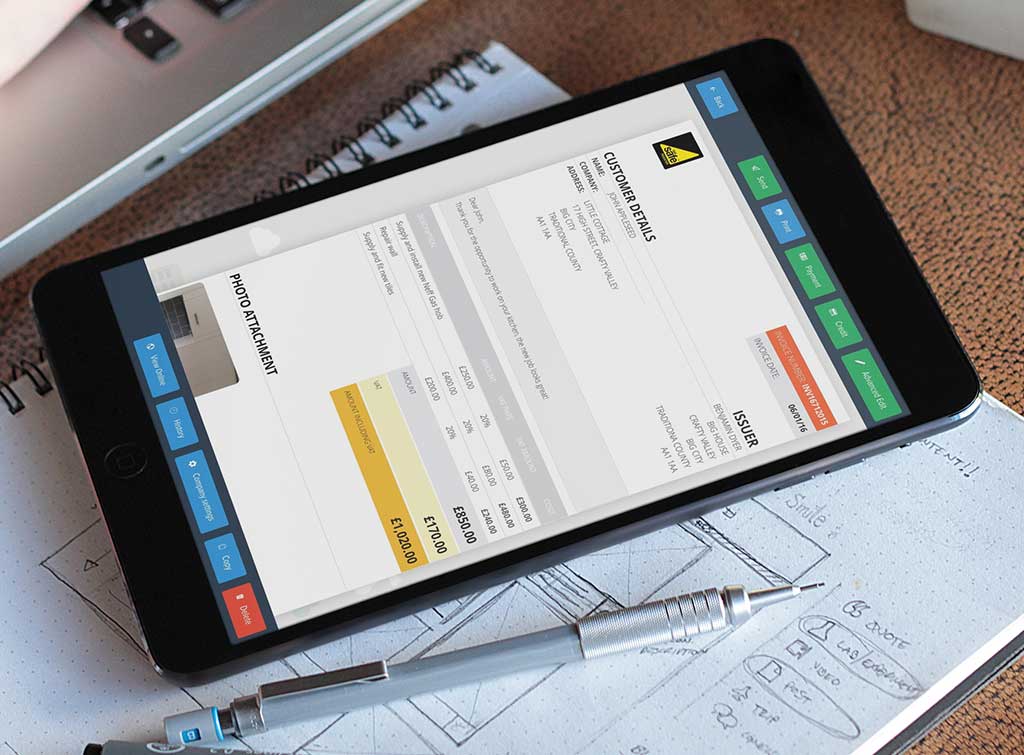Guide to financial planning for small business

Why financial planning for business owners is important
You can’t underestimate the importance of financial planning for small business. If you don’t have a plan then it is harder to achieve your goals.
Tradespeople running their own business need targets to aim for. This gives structure and purpose to what they are trying to achieve. Goals can be short-term, medium-term and long-term.
Financial planning for business owners encompasses many areas. It’s not just about managing money. Business owners also need to consider the type of lifestyle they want. So a financial plan can cover personal as well as business goals.
Set your business goals
A financial plan sets goals and milestones along the way to reaching them. Financial planning keeps businesses on track.
Financial planning needs to be flexible. Business owners know all too well that circumstances can change rapidly. Often without warning. So, financial plans and the goals you set to achieve them have to allow for uncertainty.
When you start a business, short-term planning tends to focus on getting stabilised and established. Medium-term planning looks further ahead.
Here, you might be thinking about taking on staff or moving to larger premises. You might also be looking at investing to grow the business
A long-term view is also part of financial planning for small business. Where do you see yourself and your business later in life?
This is where retirement and pensions should be factored into financial planning. Financial planning for business owners is as much about personal as well as business planning.

Write a SWOT list for financial planning
It’s not always easy to get financial planning into shape. There are so many things to think about.
It may seem easier to only concentrate on the day-to-day running of the business. That’s a mistake a lot of businesses make. It’s a short-sighted approach. Financial goals help business owners to plan for success.
A tried and tested method companies use to improve profits and plan their future is SWOT (strengths, weaknesses, opportunities, threats) analysis:
Strengths
What do you do really well, better than your competitors, that your customers like? These are key areas of your businesses that financial planning and investment should focus on. Financial strengths can be seen in strong cash flow with regular income.
Weaknesses
These are the areas that can bring down a business. They’re the things businesses often prefer not to think about. For financial planning, they include debts and poor cash flow management. They need to be managed carefully. Or, better still, removed altogether so they are no longer weaknesses
Opportunities
These are the areas that can become your strength, like winning new customers or moving into new areas of business. Changes in things like new regulations and technology, or new products coming on the market, can be opportunities. Financial planning needs to enable business owners to take advantage. This could include setting money aside ready to invest in new opportunities as soon as they emerge. It can keep you one step ahead of your competitors.
Threats
These are financial areas that can negatively impact your business. Often you can’t control them or even know when they might happen. For financial planning, this could include price rises for materials, rent increases, rising interest rates if you have bank loans and the impact of economic downturns.
The first step is to list all the key points about your business under the four SWOT headings. Then start answering the questions they pose.
Ask yourself:
- How can you make your business finances stronger?
- How can you reduce or remove risks to your financial position?
- What opportunities are there and how can you finance them?
- What things threaten your business and how can you use your finances to reduce their negative impact?

Financial planning software
Financial planning for small business can get complicated. Keeping good financial records makes it easier.
Financial planning is supported by small business accounting techniques. There are lots of software products available to help record finances.
These can help business owners make better financial decisions at the right time.
What goes into a financial plan?
One of the core parts of financial planning for business owners is cash flow. This covers income and expenditure. Other areas for financial planning include buying business assets, sales forecasting, debt and how much tax you will need to pay.
Managing cash flow
Cash flow measures the movement of money into and out of a business. There are lots of ways tradespeople can improve cash flow.
For financial planning to be effective, you have to keep on top of cash flow problems. It’s easier to have positive financial planning if your business can identify problems and deal with them. You need to do this before they have a serious negative impact.
Managing small business growth
With robust financial planning, business owners can focus more confidently on growth. If things go well, you’ll reach a point when you want to scale up and grow your business.
You often hear the expression ‘don’t run before you can walk’. In business, this means don’t try to be too ambitious with your growth plans. With realistic financial planning, you should be in a good position to grow when the time is right.
Growth is usually driven by profits. The more money you make, the more you should have available to help you grow. There’s a knack for increasing profits with strategies that can help you expand.

Keep an eye on your business assets
A lot of financial planning for business owners centres on business assets. These are the capital expenditures you need to run the business.
Business asset purchases tend to be ‘big ticket’ items, like vehicles, plant and equipment. They can have a significant impact on financial planning. They are usually expensive to buy and operate. You also need to depreciate assets to reflect the fact they won’t be worth as much in the future.
Think about tax
No financial plan would be complete without a keen eye on paying the tax you owe on time. Tradespeople face a range of taxes depending on the type of business they run.
There are ways to legally pay less tax that can be very useful for financial planning. Tax rates vary depending on the type of business you run.
Changing company status
Financial planning for business owners evolves. Many tradespeople start out as a sole trader and then set up a limited company as they grow.
For others, operating as a partnership makes more business sense. This is often the case if a group of people all have a stake in running the business.
Whatever type of business you run, financial planning is essential. The goals you set and the financial targets you need to meet are likely to vary.

Finances for retirement
If you think about what is the point of financial planning then one answer is to support you and your family. As well as making your business more profitable, a good financial plan looks ahead.
Financial planning for business owners prepares the groundwork for when you want to stop working. Retirement planning for self-employed tradespeople needs to be a key element in planning ahead. The same goes for self-employed pension planning.
By having a robust financial plan, you can avoid the risk of leaving thoughts of retirement too late. Otherwise, it might be harder to retire comfortably after a career spent building your business.
FAQs
Why is financial planning for business owners important?
Financial planning is an essential way for tradespeople to be profitable and achieve their business and personal goals.
What is a good way to assess my business to help create a strong financial plan?
A useful method is to write down your financial strengths, weaknesses, opportunities and threats (SWOT). This can give you a clear idea of where to focus your planning to maximise profits.
What goes into a financial plan?
A financial plan could include income, expenditure and managing cash flow. Also important are looking for profitable growth, managing business assets, tax considerations and retirement.
Ready to take your business to the next level?
We can help you get there
DISCLAIMER
This is information – not financial advice or recommendation. The content and materials featured or linked to on this blog are for your information and education only and are not intended to address your particular personal requirements. The information does not constitute financial advice or recommendation and should not be considered as such. Checkatrade website is not regulated by the Financial Conduct Authority (FCA), its authors are not financial advisors, and it is therefore not authorised to offer financial advice.
Always do your own research and seek independent financial advice when required. Any arrangement made between you and any third party named or linked to from the site is at your sole risk and responsibility. Checkatrade blog and its associated writers assume no liability for your actions.



No comments yet!